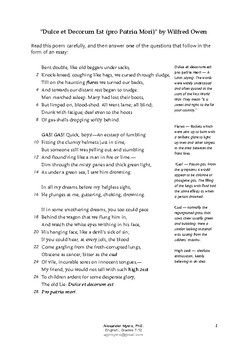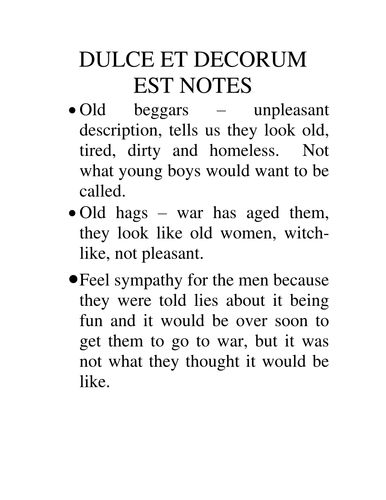
Dulce et Decorum Est - Bent double, like old beggars under sacks - The Academy of American Poets is the largest membership-based nonprofit organization fostering an appreciation for contemporary poetry and supporting American poets War is usually a bloody series of battles between 2 or more factions. Usually, it is between different tribes or countries. In Dulce et Decorum, Wilfred Owen describes war as being deadly, very bloody, and disgusting where soldiers are innocently killed, ripped apart, and treated like beggars without hope or worth. However, during wars, countries The poem ends with Owen’s sarcastic condemnation of jingoism: “Dulce et Decorum est pro patria mori,” which translates as ‘It is sweet and honourable to die for one's country’
Wilfred Owen: Poems “Disabled” Summary and Analysis | GradeSaver
War is usually a bloody series of battles between 2 or more factions. Usually, it is between different tribes or countries. In Dulce et Decorum, Wilfred Owen describes war as being deadly, very bloody, and disgusting where soldiers are innocently killed, ripped apart, and treated like beggars without hope or worth.
In the first stanza, Owen portrays the impression that dulce et decorum est essays makes the soldiers more dulce et decorum est essays and hag-like, dulce et decorum est essays. Soldiers are working until their bodies are twisted and contorted, making their experience seem completely different than the sort of marching we usually see in military parades.
It is comparable to beggars who have terrible health, sickly bodies, and old hags. They are abnormally deformed with their knees closed together while their ankles far apart. In stanza 1 again, Owen gives the impression that war is disappointing and makes the soldiers appear drunk, or even like zombies from the exhaust, continuing their fight to survive.
Even without a gas bomb or a battle, they are still like zombies, dulce et decorum est essays. They seem sick or drunk-like even before they started a battle or survived a gas bomb.
Now, it is like background noise for them. This gives the impression that war promotes hopelessness, making soldiers want to die as they are worn-out by work. In stanza 2, Owen gives the impression that war is clumsy and may be slow or too easy to survive. Quick, dulce et decorum est essays, boys! GAS is in capitals portrays the yell of warning and panic, while an exclamation mark reflects a feeling of shock and surprise. It is repeated in exclamation marks to convey how much time it took for them to realize, amid all the confusion and chaos.
This gives the impression that war was disorganized and just a constant battle to stop yourself from being the victim of the survival series. In the 2 nd stanza, Owen conveys that soldiers die slowly and devil-like. It also shows the helplessness of watching the soldiers die in disgusting, melting-like ways.
This creates an impression that war is terribly disgusting and VERY painful. In the 3 rd stanza, it shows how war is as bad as your eye can see or even imagine, Owen compares the scene of the dying man slowly from the gas to the worst of nightmares that haunt you every night.
Because the trio of verbs are verbs that end in —ing, it gives the sense that the action is in the present tense. The soldiers die over and over in his dream, making the suffering of dulce et decorum est essays casualties never-ending. Owen described how disgusting war and death are and then sarcastically warns the reader that war is not like what children and teenagers think it is, but that is the impression the country gives to them, which is nothing but an old lie.
In a sarcastic tone, showing that it is obvious that it is not what children and teenagers think of as all glory, victory, and pride. With great enthusiasm and energy, you would not tell them confidently that it is sweet and right to die dulce et decorum est essays your country because on the inside you know you are wrong. In the poem, Owen gives the impression and explains the reality of war.
The terrible reality is described by the gruesomeness and the state in which the soldiers try to survive, wasting their lives innocently. He is showing how it is not at all like what the people think and encourage the children to go to war, dulce et decorum est essays. All that about glory and right and sweetness to DIE for your country is nothing but lies to persuade you into war by tricking you into thinking it is all energy and victory.
If we have helped you, please help us fix his smile with your old essays it takes seconds! Le Romanticisme était un mouvement dans la litterature Française, et aussi dans tous les arts,…. Tutor and Freelance Writer. Science Teacher and Lover of Essays. Article last reviewed: St. Rosemary Institution © Creative Commons 4. Because the trio of verbs are verbs hat end in —ing, it gives the sense that the action is in the present tense.
Skip to content. Find out More. Le Romanticisme et le Réalisme Le Romanticisme était un mouvement dans la litterature Française, et aussi dans tous les arts,….
Dulce Et Decorum Est by Wilfred Owen: Poem Analysis Wilfred Owen — fought on the western front in World War I also called the…. Newest Oldest Most Voted. Inline Feedbacks. Maxine Mason. Adam W. Reply to Maxine Mason 1 year ago. ATTENTION: If we've helped you, please give back. Help us feed and clothe children with your old homework! It takes seconds!
Dulce Et Decorum Est Literature Essay Response
, time: 9:36Analysis of Poem "Dulce Et Decorum Est" by Wilfred Owen - Owlcation

Wilfred Owen, who wrote some of the best British poetry on World War I, composed nearly all of his poems in slightly over a year, from August to September In November he was killed in action at the age of 25, one week before the Armistice. Only five poems were published in his lifetime—three in the Nation and two that appeared anonymously in the Hydra, Bent double, like old beggars under sacks, Wilfred Owen, who wrote some of the best British poetry on World War I, composed nearly all of his poems in slightly over a year, from August to September Dulce et Decorum Est - Imagery, symbolism and themes Imagery in Dulce et Decorum Est Simile. Dulce et Decorum Est is rich in similes whose function is to illustrate as graphically as possible the gory details of the war and in particular a gas attack. ‘like old beggars’ lThe soldiers are deprived of dignity and health like the elderly and dispossessed who are reduced
No comments:
Post a Comment